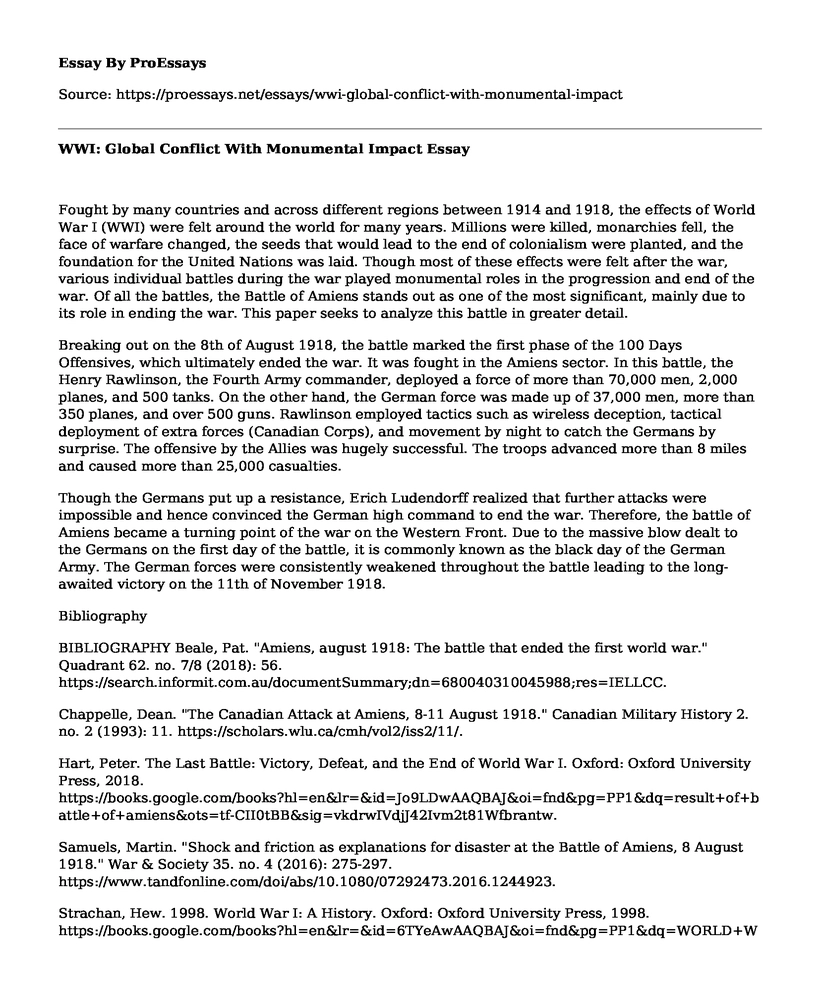Fought by many countries and across different regions between 1914 and 1918, the effects of World War I (WWI) were felt around the world for many years. Millions were killed, monarchies fell, the face of warfare changed, the seeds that would lead to the end of colonialism were planted, and the foundation for the United Nations was laid. Though most of these effects were felt after the war, various individual battles during the war played monumental roles in the progression and end of the war. Of all the battles, the Battle of Amiens stands out as one of the most significant, mainly due to its role in ending the war. This paper seeks to analyze this battle in greater detail.
Breaking out on the 8th of August 1918, the battle marked the first phase of the 100 Days Offensives, which ultimately ended the war. It was fought in the Amiens sector. In this battle, the Henry Rawlinson, the Fourth Army commander, deployed a force of more than 70,000 men, 2,000 planes, and 500 tanks. On the other hand, the German force was made up of 37,000 men, more than 350 planes, and over 500 guns. Rawlinson employed tactics such as wireless deception, tactical deployment of extra forces (Canadian Corps), and movement by night to catch the Germans by surprise. The offensive by the Allies was hugely successful. The troops advanced more than 8 miles and caused more than 25,000 casualties.
Though the Germans put up a resistance, Erich Ludendorff realized that further attacks were impossible and hence convinced the German high command to end the war. Therefore, the battle of Amiens became a turning point of the war on the Western Front. Due to the massive blow dealt to the Germans on the first day of the battle, it is commonly known as the black day of the German Army. The German forces were consistently weakened throughout the battle leading to the long-awaited victory on the 11th of November 1918.
Bibliography
BIBLIOGRAPHY Beale, Pat. "Amiens, august 1918: The battle that ended the first world war." Quadrant 62. no. 7/8 (2018): 56. https://search.informit.com.au/documentSummary;dn=680040310045988;res=IELLCC.
Chappelle, Dean. "The Canadian Attack at Amiens, 8-11 August 1918." Canadian Military History 2. no. 2 (1993): 11. https://scholars.wlu.ca/cmh/vol2/iss2/11/.
Hart, Peter. The Last Battle: Victory, Defeat, and the End of World War I. Oxford: Oxford University Press, 2018. https://books.google.com/books?hl=en&lr=&id=Jo9LDwAAQBAJ&oi=fnd&pg=PP1&dq=result+of+battle+of+amiens&ots=tf-CII0tBB&sig=vkdrwIVdjJ42Ivm2t81Wfbrantw.
Samuels, Martin. "Shock and friction as explanations for disaster at the Battle of Amiens, 8 August 1918." War & Society 35. no. 4 (2016): 275-297. https://www.tandfonline.com/doi/abs/10.1080/07292473.2016.1244923.
Strachan, Hew. 1998. World War I: A History. Oxford: Oxford University Press, 1998. https://books.google.com/books?hl=en&lr=&id=6TYeAwAAQBAJ&oi=fnd&pg=PP1&dq=WORLD+WAR+I+-+a+history+hew+stratchan&ots=EEpRvxpQ3p&sig=PSPo1cFAm7hrdj1ZTreuCrYTfrk
Cite this page
WWI: Global Conflict With Monumental Impact. (2023, Feb 06). Retrieved from https://proessays.net/essays/wwi-global-conflict-with-monumental-impact
If you are the original author of this essay and no longer wish to have it published on the ProEssays website, please click below to request its removal:
- Andrew Jackson's Military Career
- Essay Sample on Historical Identification
- How the Cold War Shaped the United States Foreign Policy
- The Age of the Late Renaissance in England Essay
- Arctic Council International Government Organization Paper Example
- America's Reconstruction: Addressing Inequities Since 1865 - Essay Sample
- Chinese Migration to Australia in 1850s: A Gold Rush Tale - Essay Sample







